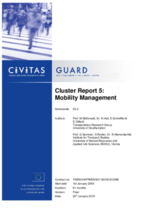Mobility management in Coimbra
Thematic areas
Behavioural change & mobility management
- Mobility marketing and awareness raising
- Mobility Planning
Summary
In this measure, Coimbra will implement a new approach to its mobility management strategy and develop several site-based travel plans and transport services for some of the largest public services in Coimbra, namely in the city’s health cluster.
Implementing sustainable mobility
In Portugal there is no tradition in using travel plans for managing mobility. In Coimbra, mobility management has been a constant concern for the municipal authorities, despite all the practical limitations that management has undergone throughout the years. Regardless of all the efforts developed to motivate the use of the public transport, the use of individual private vehicles has been constantly growing.
Coimbra is characterised by a strong concentration of health services (with two central hospitals which extend their influence to the whole central region of the Portugal) and educational services, mainly at the University level (the University of Coimbra is Portugal’s oldest University and one of the oldest in Europe). In this sense, Coimbra is essentially a service-based city which attracts a high number of journeys from the municipality, the metropolitan area, and the central region as a whole.
Accordingly, the aim is to identify the best practices in mobility management and development mobility policies which can be more successful in contributing to a change in the modal split which emphasizes greater sustainability.
As a result, in an effort to solve some of its mobility problems, the city of Coimbra decided to adopt a mobility management approach by developing and implementing site-based travel plans. The Municipality and the Municipal Public Transportation Services of Coimbra (SMTUC) decided to develop travel plans for its urban health cluster. Accordingly, the city developed and implemented a travel plan at the Coimbra Oncological Hospital and implemented several mobility management actions in the adjacent University Hospital and Paediatric Hospital. In this initial stage the travel plan is focused on hospital employees. The main objective of the travel plan and mobility management actions is to contribute to a modal shift which emphasises other means of transportation besides the private car.
Progress
The initial stage of the measure involved establishing contacts between the different hospital administrations in order to obtain their commitment to the initiative. After prolonged negotiations due to changes in the administrative structures of the hospitals, all three hospitals committed themselves.
The plans are initially targeted at hospital staff. Due to the uniformity and predictability of their mobility patterns, it was decided that the plans would be divided into three distinct stages: 1st for hospital staff; 2nd for hospital patients and visitor; and 3rd for hospital logistics (deliveries and hospital vehicles). Accordingly, the first stage will be developed during the current CIVITAS project, and the other two stages will follow-up as soon as all three staff travel plans are implemented.
At the moment, the site audit is being conducted at the University Hospital and the Paediatric Hospital. The site audit is fundamental in order determine the current situation at the institutions pertaining to mobility issues, especially the travel patterns of the hospital staff.
At the Oncological Hospital the plan has already been approved and implemented. The first measures of the plan were implemented during the 2011 European Mobility Week and were:
• 25 percent ticket discount on Park & Ride system for hospital staff;
• new public real-time PT information panels in the interior of the hospital;
• site-dedicated PT network maps and destination matrix.
The overall objective of the Oncological Hopsital Plan is to contribute to an alteration of the current modal share, namely reducing individual car use in 4 percent (from the current 63 percent to 59 percent in 2015). The travel plan has a 4 year implementation scheme which defines the measures and initiatives, their overall objective, and the organisation responsible for carrying them out (i.e., Hospital, Municipal Urban Public Transportation Services, or Municipality). Some of the more significant measures programmed are:
• Personalised travel planning;
• Car pooling programme;
• Improve pedestrian conditions;
• Improve cycling conditions;
• Campaigns promoting sustainable mobility;
• Parking management scheme.
Simultaneously, Coimbra has been promoting sustainable mobility through the regular origination of school visits to the Municipal Urban Public Transportation Services (SMTUC) installations and by carrying out several promotional campaigns directed at the general public.
Outcomes
The key results of this measure are:
• Modal shift of 10,3% from private car to public transport at the Oncological Hospital, resulting from the implementation of the travel plan.
• Increase of operating revenues. The measure induced a 28% increase of the average operating revenues related to the employees of the hospital that transferred to public transport (+0,007 €/pkm).
• Contribution to energy efficiency in the city, resulting in significant energy savings in the displacement of the hospital staff (-15,1%) due to the assessed significant reduction of the energy consumption per passenger (-0,31 MJ/pkm).
• Mitigation of CO2 emissions leading to savings (-12,89 g/pkm) that corresponded to 273 ton CO2 during the first year of mobility plan implementation.
The development and implementation of travel plans and mobility management actions in Coimbra has catalysed a change in mentalities in planning technicians and local decision-makers. The participation of technicians from Municipality and SMTUC in 4 VANGUARD / EPOMM training sessions on mobility management issues also helped to transfer knowledge for the referred behaviour changes. After many decades focused on traffic management activities, Coimbra now acknowledges that mobility management solutions, especially travel plans, is a practical and valuable way of dealing with the city’s mobility challenges. This new interest also contributed to Municipality and SMTUC co-organising with VANGUARD the training in Coimbra on Social Inclusion.
The board of Administration of the University hospital has recently sanctioned the development of a travel plan to be implemented in the upcoming year.








